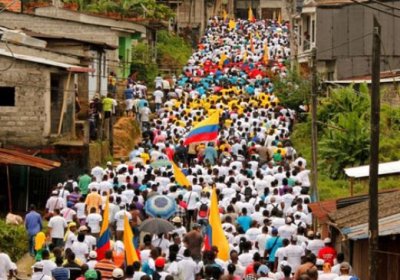Thousands of striking teachers seized two of Mexico City's central thoroughfares on a march to the president's residence on September 11 after losing their battle to block new educational reforms less than 24 hours earlier.
The teachers disrupted the centre of the city for at least the 14th time in two months, decrying a plan designed to break union control of Mexico's education system and, they say, damage education in Mexico's poor south in the process.
Economy
In a national census held over September 7 and 8, 1150 communes registered in a national census, exceeding expectations.
The communes are forms of “popular power” in Venezuela that unite representatives of local communal councils across a regional area. Community councils in Venezuela are grassroots bodies where local residents manage public funds and undertake projects promoting community development.
Communes, meanwhile, are formed by groups of community councils, and can take on larger scale projects and public works.
The secret Trans-Pacific Partnership (TPP) is about to become even more secret, perhaps seen as a necessity in light of plans to make it easier for tobacco companies to sue while making health care more difficult to obtain.
The upcoming federal elections in Germany, scheduled for September 22, are unlikely to change the character of German politics regardless of the outcome.
The two main parties remain committed continuing to represent the interests of German corporations over its people.
Die Linke (The Left Party) provides a left parliamentary alternative, but it has not succeeded in convincing ordinary, working people that a break of the status quo is possible.
New Zealand celebrities have joined protests against proposed law changes that will remove the right of public consultation on applications for deep sea oil and gas drilling. Law changes will also remove the right to protest at sea.
Actors Sam Neill, Lucy Lawless and Robyn Malcolm, former Supreme Court judge Sir Ted Thomas and many others have joined Maori and environmental groups to condemn the government’s plans.
Representatives of the Colombian rural poor (campesinos) began negotiations with the government on September 12, three-and-a-half weeks into an uprising against “free-trade” policies.
By blockading highways and stopping work since August 19, Colombian campesinos made a dramatic statement for a fairer economy and greater independence from the United States.
The central demand was and is the abolition of the free-trade agreements (FTAs) with the US and EU, and guaranteed minimum prices for their agricultural products.
The fight to defend public education is shaping up to be a key campaign against the cutback agenda of the Colin Barnett government in Western Australia. Thousands of teachers and education assistants rallied outside state parliament on September 3 in two separate mobilisations and further industrial action is planned.
The government claimed it has not cut education funding. However, the central issue is not about overall funding but the cuts to staffing levels. In August, the government announced they were planning to cut 500 education assistants and other support workers.
The proposed fate of Istanbul’s Gezi Park has much in common with the current re-development plans for Barangaroo in Sydney’s East Darling Harbour. Sydneysiders concerned about the Crown/Lend Lease takeover bid can draw inspiration from the Gezi Park occupiers and send a clear message of defiance to James Packer’s fawning peons in the Barry O’Farrell government.
All over the world, the privatisation of public space is growing. As Anna Minton, leading policy analyst and author of Ground Control, has pointed out in connection with the situation in Britain.
September 11 is a date forever associated with mass murder of civilians — and this was the case nearly three decades before the 2001 terrorist attacks on the Twin Towers in New York.
This year, September 11 marks the 40th anniversary of the US-organised military coup that overthrew the elected left-wing government of Salvador Allende and installed a brutal dictatorship headed by General Augusto Pinochet.
The day was the start of a nightmare for Chileans, as a reign of terror crushed left-wing groups, trade unions and popular organisations.
An uprising of the rural poor (campesinos) in Colombia entered its 11th day on August 29. An estimated 250,000 people took part in strikes and highway blockades across the South American country's highlands, where most of Colombia’s population of 42 million is concentrated.
The central objective of the uprising is to guarantee minimum prices for agricultural products, and to annul Colombia’s free trade agreements (FTAs) with the United States and the European Union.
Western Australian Liberal Premier Colin Barnett admitted on August 21 that his government faced a tough start to its second term. This followed fee rises and controversial attacks on the public sector in the August 8 state budget, which provoked a backlash including an August 30 decision by school teachers to plan an industrial campaign.
Ender Imrek is a member of the Taksim Platform, the key organising centre during the Gezi Park protests. He is also former vice-president of the revolutionary socialist party Labour Party-Turkey (EMEP) and a central executive member of left-wing umbrella group the People’s Democratic Congress (HDK).
The HDK played a key role during the Gezi protests, when police brutally evicted protesters seeking to stop the destruction of trees in Taksim Gezi Park in May. He spoke to Green Left Weekly's I. Zekeriya Ayman
* * *
Can you tell us about the HDK?
- Previous page
- Page 251
- Next page








